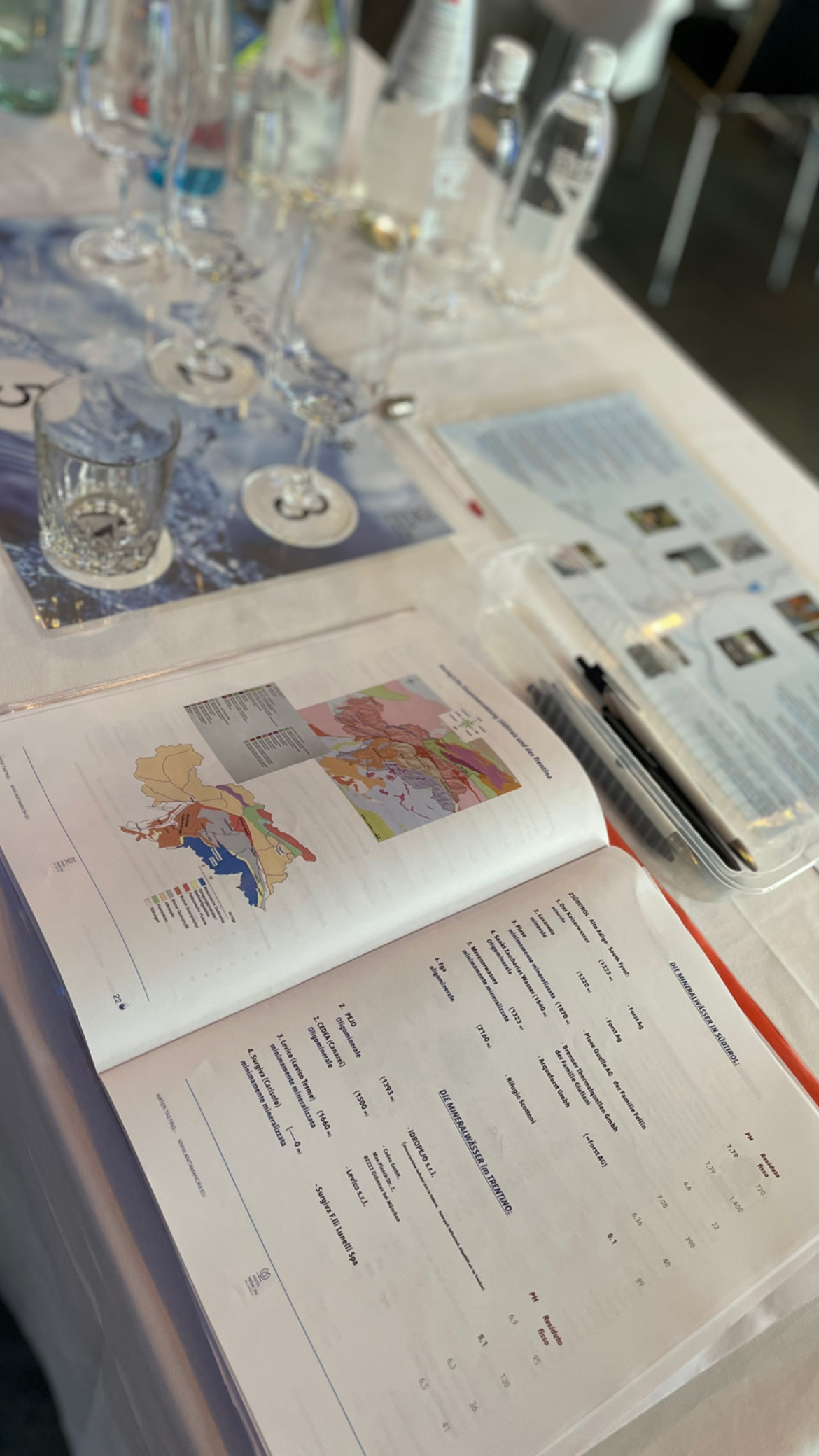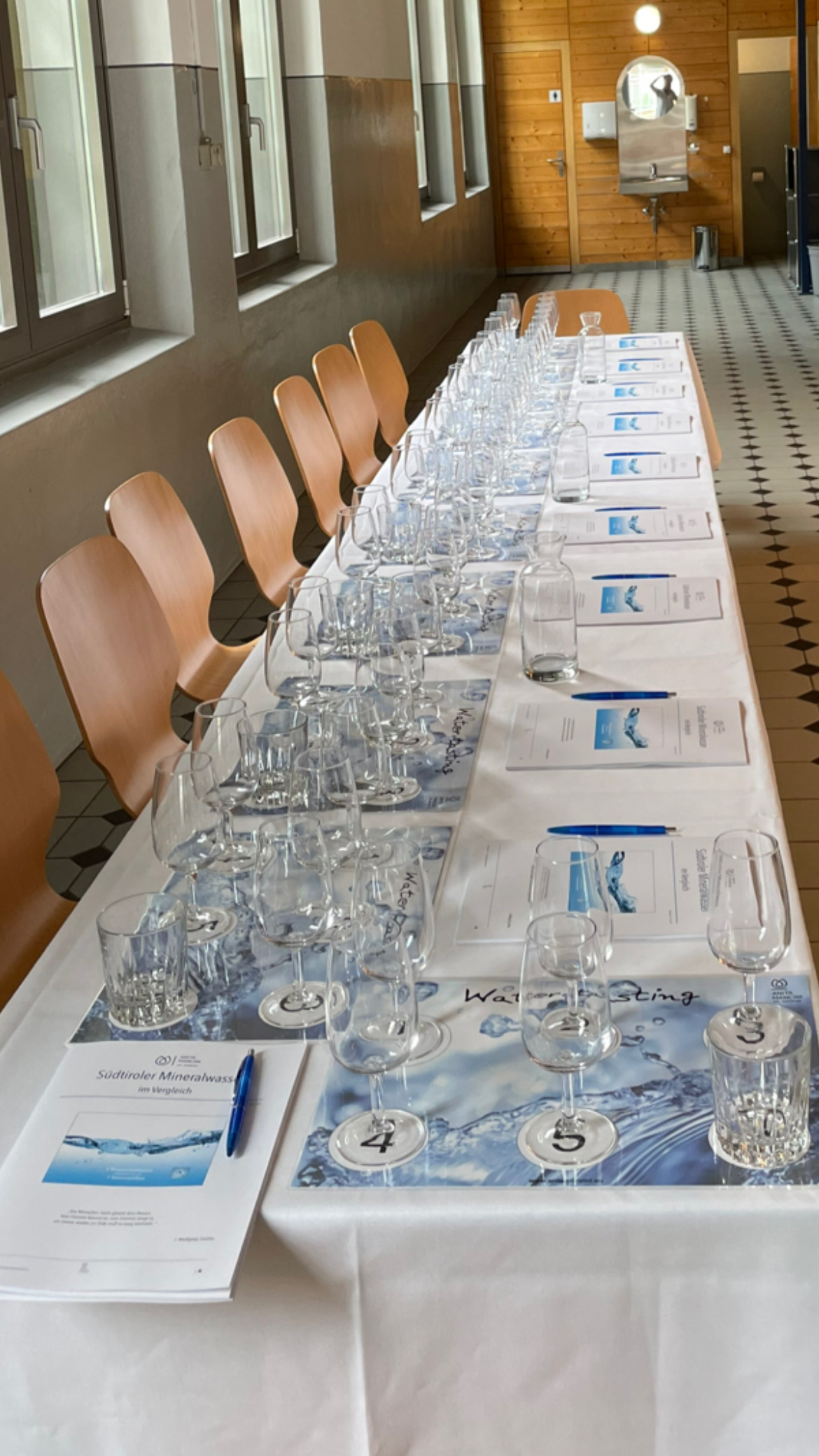Did you know that water is the most googled element? Counting about 5,320,000 searches every 0.56 seconds, and that only considering the German, Italian and English translation. It is also the most studied and vital element of all. The fact that water and oxygen are the most important elements for life on earth is clear by now, but what is it that makes water so special? And why is Italy the world’s second-largest exporter of it and Europe’s biggest consumer? Where does water come from and where does it go? What does it pick up along the way and how does it affect our bodies? The importance of water has obviously led to the development of new emerging professions, such as that of the Water Sommelier – Idrosommelier© A.D.A.M.
Anita Mancini was born in Brunico and has been living and working in Dobbiaco since the year dot. As a trained IdrosommelierÓ and Sommelier Professionista AIS, she now holds conferences and water tastings both in Italy and abroad. About 14 years ago she concluded her massage therapist training programme in Graz, Austria, which also included balneotherapy and aromatherapy. But it was after sustaining serious injuries in a car accident that water started gaining more and more importance in her life. It is now normal for her to regularly stop at bars and drink two to three litres of water.
South Tyrol is a true water paradise. Italy has about 296 different mineral water sources containing all sorts of substances. However, only 6 types of mineral water are marketed in South Tyrol and 4 in Trentino. But there are multiple differences to consider. Geology plays an important role in this, as Central Alps waters are substantially more acidic compared to those flowing in the Dolomites. However, despite being low in number, South Tyrolean mineral waters are actually popular worldwide. Considering the variety of mineral waters available in Italy, ranging from more salty tasting waters with a total dissolved solids concentration of 3,000 mg/l in Sardinia to a minimum of 25 gr/l in South Tyrol, there is definitely something for everyone. The depth of underground water flows and the length of time that they spend in aquifers have a huge impact on their purity and mineral content. As a result, not all mineral waters are equally thirst-quenching.
But how do average consumers know what they are actually drinking? That’s what water sommeliers are for. They can teach us how to read labels, on which all the fundamental information about the product appears. Once we learn how to make sense of labels, we will easily know whether to expect a more sweet, sour, or salty taste and whether the water might contain any unwanted nitrites. Besides having a unique taste, different mineral waters can also have a distinct smell, even though that is not always the case. In addition to that, the pressure of water when it resurfaces from the ground plays a key role in the formation of hydrocarbonate, especially with volcanic rock.
Natural mineral water always originates from underground water sources and has specific hygienic features and multiple health benefits. It may be distinguished from ordinary drinking water based on its natural purity, the properties of its constituents that are listed on the label and its mineral levels, which are constantly monitored. As a matter of fact, these attributes cannot change and have to remain stable over time.
Mineral water is the result of rainwater seeping through the soil. More specifically, rainwater saturates underground rock which then, according to current geological theories, affects groundwater composition and gives it distinct features through a dissolution process.
Given the geological diversity of South Tyrol, this area includes multiple different types of groundwaters of various composition. Some of these are characterised by very unique elements, such as the radioactive gas radon or other unconventional elements like lithium, selenium and iodine. The depth of groundwater flows and the amount of time that groundwater remains in aquifers play an important part in the journey of water, just like its pressure and temperature when it shoots towards the surface.
Human beings drink about 25,000 litres of water on average over the course of their lives. That is why being aware of what we drink and learning how to take care of our environment and keeping it clean is so important. Water is also believed to have the ability to retain a memory of all the information it picks up along its journey. Therefore, it clearly plays a major role in other industries too, such as Bach flower therapy
or the distillation process of spirits and other alcoholic drinks, like whisky or beer, as water hardness may affect them.
Ultimately, it is also important to note that 3 billion people globally do not have access to safe drinking water.
In Italy, mineral waters are monitored and recognised by the Ministry of Health in Rome and they are classified as follows:
Consumption in Italy
- Minimamente mineralizzate – very low in minerals (TDS* < 50 mg/l) 12%
- Oligominerali – low in minerals (TDS < 500mg/l) 61%
- Minerale – mineral (TDS 500mg/l – 1,500 mg/l) 25%
- Ricche di Sali minerali – rich in minerals (TDS > 1,500 mg/l) 2%(*TDS – Total Dissolved Solids)Italy can currently count on about 240 water bottling plants, and a total of around 450 different labels and companies. As of 2020, the number of mineral water brands in Germany amounted to approximately 850.



Neueste Kommentare